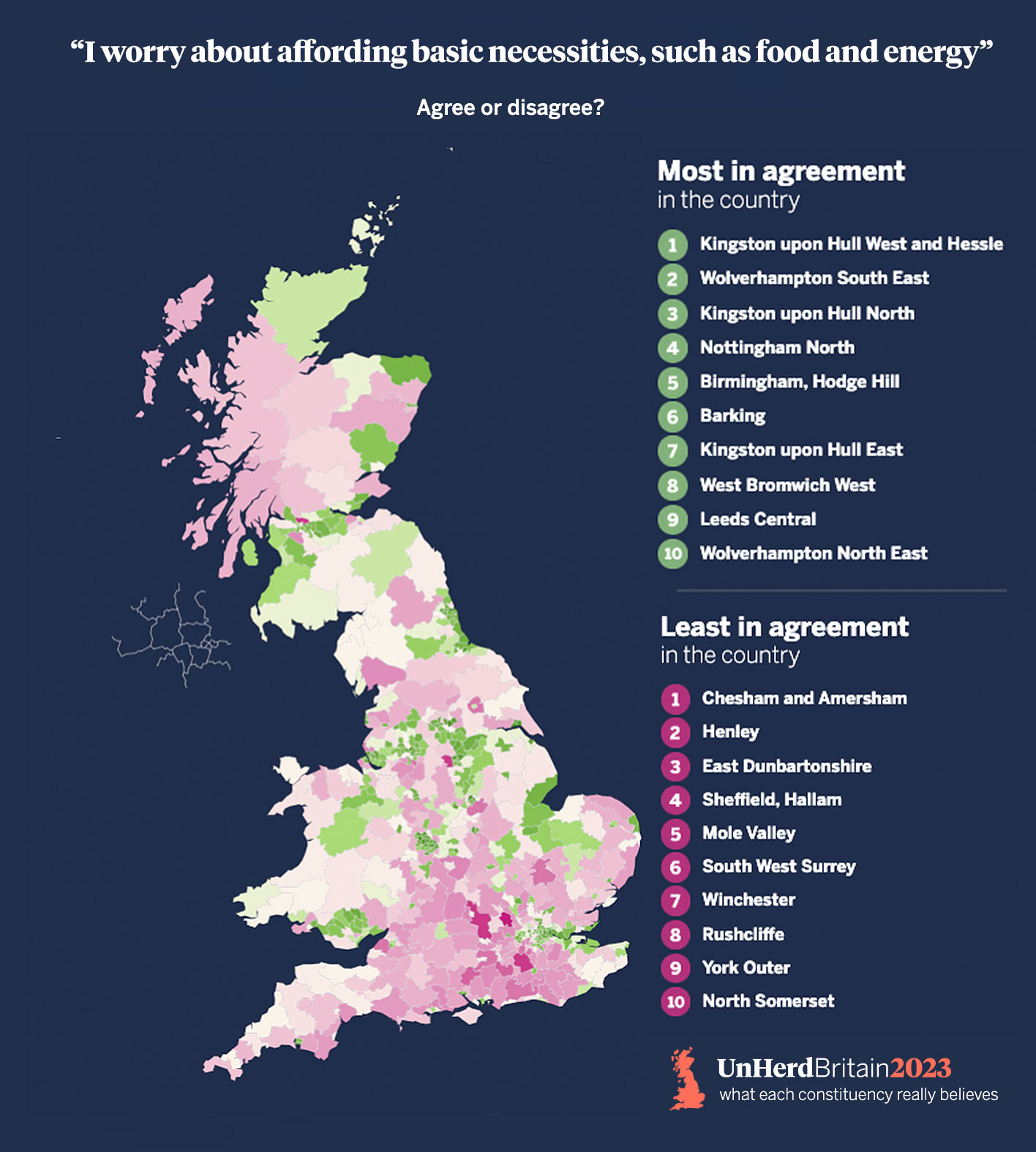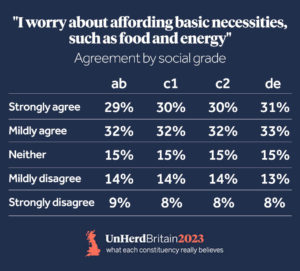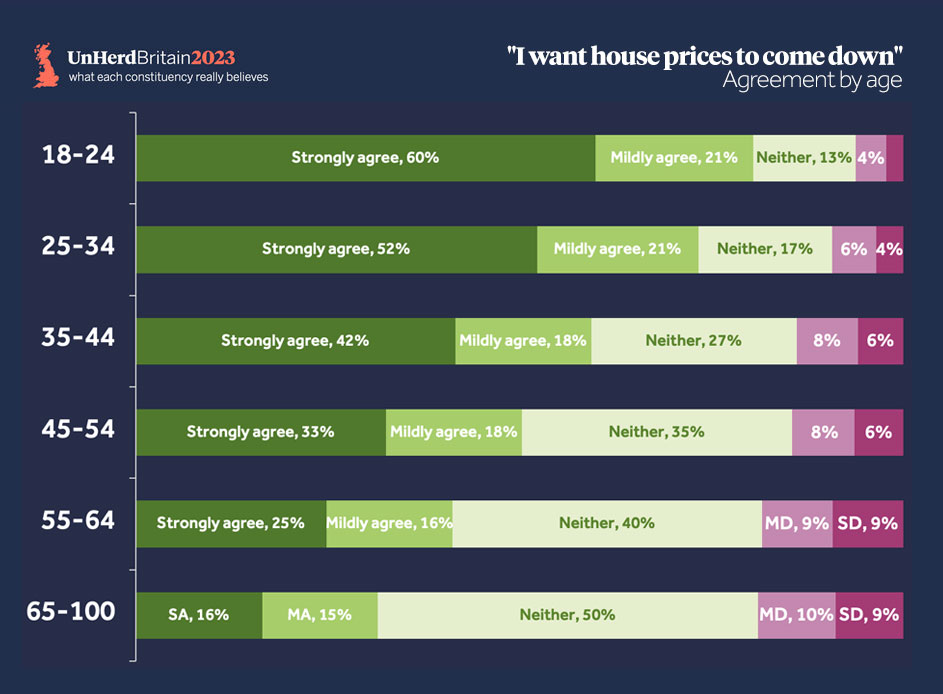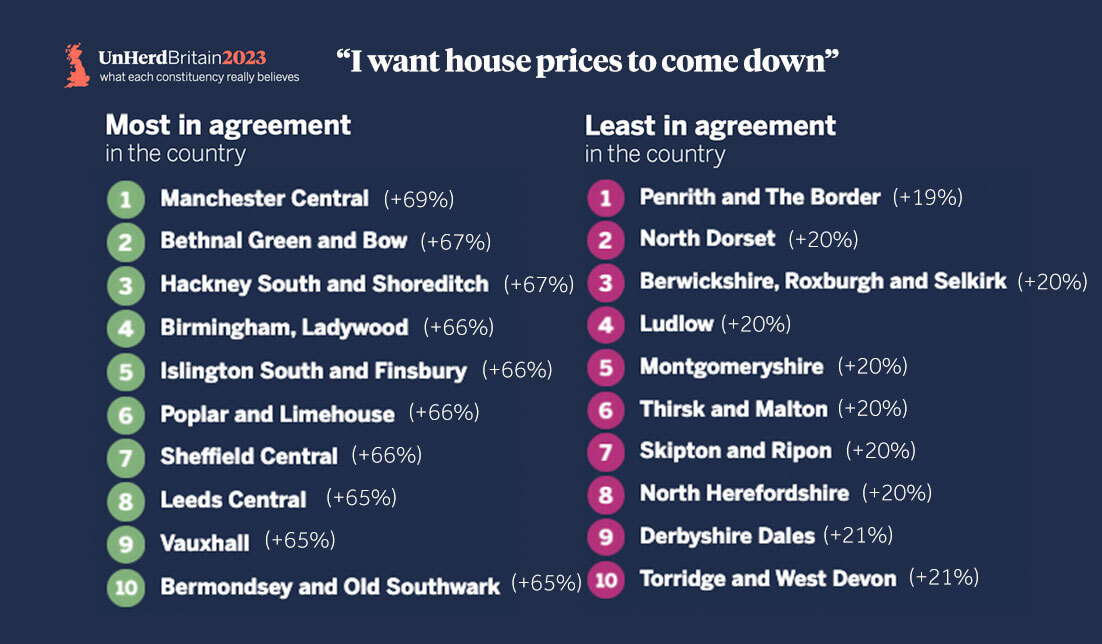The latest wave of polling from UnHerd Britain confirms the breadth and depth of concern about increased costs of living. 62% of the British population agree with the statement, “I worry about affording basic necessities, such as food and energy”, of which 30% agree strongly. Only 22% of the population disagree, and 15% are unsure.
Over 10,000 voters responded to the survey, conducted by FocalData; the researchers then analysed the data using MRP to produce estimates for all 632 constituencies in Great Britain (the Northern Irish constituencies are more difficult to poll in this manner, and have been excluded from the exercise).
The results reveal a cost of living map of Britain, in which the areas that are most concerned are shown to be in clear pockets: London and the Thames Estuary, South Wales, the Wash, the industrial North East and many of the so-called “red wall” seats across the North Midlands that moved from Labour to the Conservatives in recent elections.
Interestingly, the level of concern far exceeds what you might expect based on poverty or deprivation in a particular area. Voters in even the richest constituencies in the country tend to feel anxious about affording basic necessities (though perhaps their definition of a basic necessity might be different). Thus in Henley and Amersham and other affluent enclaves outside London we still found the largest group was anxious about the cost of living: 52% in the case of Amersham and 53% in the case of Henley. This compares to 73% in the most anxious constituency, Kingston upon Hull.
In Liz Truss’s constituency of South West Norfolk, 62% are anxious about cost of living, and in Boris Johnson’s constituency of Uxbridge and Ruislip the figure is 63%. Whether these former prime ministers will be blamed for the financial uncertainty their constituents now feel will become clearer at the next election.
Analysis of the results by social grade (the standard method for grouping respondents by affluence) shows that they do not vary as much as you might expect. While 64% of voters in the lowest social grades D and E are feeling anxious about affording basic necessities, so are 61% of people in the top social grades of A and B.

 Main Edition
Main Edition US
US FR
FR










Join the discussion
Join like minded readers that support our journalism by becoming a paid subscriber
To join the discussion in the comments, become a paid subscriber.
Join like minded readers that support our journalism, read unlimited articles and enjoy other subscriber-only benefits.
SubscribePerhaps people are just responding to an assertion that is flavour of the month in the media (and hence Government attention) merited or not?
The difficulty with many surveys and polls is that people tell you what they think about the question you ask, or the assertion you make… but not what they will actually do.
Absolutely. Polls are pretty useles, in fact.
Indeed they can be positively pernicious. The humorist creator of Dilbert responded to a poll indicating that over 50% of black US Americans thought that it was “not OK to be white” by suggesting that this implied blacks were a hate group. On the face of it he had a point and it was scarcely racist to call out the apparent racism of the majority of US blacks,
If a majority of white respondents considered it was not OK to be black that would certainly be regarded as highlighting a racial problem and it is hard to imagine that this would not be responded to fiercely. However, I find it hard to believe that a majority of blacks in fact thought the mere possession of comparatively pale skin was a problem or that presumably the solution was whites darkening their skin. Clearly there was some subtext that produced an otherwise bizarre response indicating widespread racism in the US black population.
It is equally odd that Dilbert’s creator should have been cancelled for sarcastically pointing out the apparent racism of the response to the poll – a poll that it is hard to imagine a polling organisation even asking the question as to whether white respondents thought being black was not OK.
They’re worse than that: they’re misleading.
Indeed they can be positively pernicious. The humorist creator of Dilbert responded to a poll indicating that over 50% of black US Americans thought that it was “not OK to be white” by suggesting that this implied blacks were a hate group. On the face of it he had a point and it was scarcely racist to call out the apparent racism of the majority of US blacks,
If a majority of white respondents considered it was not OK to be black that would certainly be regarded as highlighting a racial problem and it is hard to imagine that this would not be responded to fiercely. However, I find it hard to believe that a majority of blacks in fact thought the mere possession of comparatively pale skin was a problem or that presumably the solution was whites darkening their skin. Clearly there was some subtext that produced an otherwise bizarre response indicating widespread racism in the US black population.
It is equally odd that Dilbert’s creator should have been cancelled for sarcastically pointing out the apparent racism of the response to the poll – a poll that it is hard to imagine a polling organisation even asking the question as to whether white respondents thought being black was not OK.
They’re worse than that: they’re misleading.
Absolutely. Polls are pretty useles, in fact.
Perhaps people are just responding to an assertion that is flavour of the month in the media (and hence Government attention) merited or not?
The difficulty with many surveys and polls is that people tell you what they think about the question you ask, or the assertion you make… but not what they will actually do.
Maybe the actual report specifies this but without knowing what people regard as a necessity in terms of food or energy or what other elements of a household budget are included, this tells us nothing.
For some that might mean being worried about whether they can afford to keep shopping at Waitrose and having to consider radical options like Sainsbury’s. Or it could mean that they are considering turning the thermostat down to just 20. and forsaking the shorts and flip flops. How do we know what people had in mind 62% of people mind are thinking of as “necessities” and “worries” and whether it is even a real concern or that they are just the worried sort.
Mobile phones are now considered a “necessity”. Ask any gang or cartel member in South Central Los Angeles or the south side of Chicago. Or any teenager, derelict, welfare queen or voluntarily homeless person. Food, water, clothing and shelter are necessities. People in developing countries understand this. They don’t need pollsters to stoke their fears, which are real and existential.
Mobile phones are now considered a “necessity”. Ask any gang or cartel member in South Central Los Angeles or the south side of Chicago. Or any teenager, derelict, welfare queen or voluntarily homeless person. Food, water, clothing and shelter are necessities. People in developing countries understand this. They don’t need pollsters to stoke their fears, which are real and existential.
Maybe the actual report specifies this but without knowing what people regard as a necessity in terms of food or energy or what other elements of a household budget are included, this tells us nothing.
For some that might mean being worried about whether they can afford to keep shopping at Waitrose and having to consider radical options like Sainsbury’s. Or it could mean that they are considering turning the thermostat down to just 20. and forsaking the shorts and flip flops. How do we know what people had in mind 62% of people mind are thinking of as “necessities” and “worries” and whether it is even a real concern or that they are just the worried sort.
62% of Brits worried about basic necessities? How many of them have the latest smartphone or flat-screen TV with surround sound? How many have cut temperatures in their houses?
I suspect people are in fact responding to worry about the cost of necessities rather than the idea contained in the question that they will be unable to feed, cloth, house and heat themselves to sustain their very existence. Clearly there are a few people who can’t afford these things having cut back on everything else but for most people the worry is that necessities take up an increasing proportion of their income and other things they have enjoyed in the past have to be forgone.
It is difficult if you come from a time when there was virtually nothing except going to work and going to bed. This was not hundreds of years ago – this was the age of the young ‘boomers’.
Today it makes me almost ill to hear young people who have almost anything they want talk about the ‘boomers’ as if they were a sick race aliens.
It is difficult if you come from a time when there was virtually nothing except going to work and going to bed. This was not hundreds of years ago – this was the age of the young ‘boomers’.
Today it makes me almost ill to hear young people who have almost anything they want talk about the ‘boomers’ as if they were a sick race aliens.
Smart phones are a neccessity and I say this as someone who is NOT on social media but who uses my phone to coordinate with my kids after school activities (school events and communication are app driven now) and also do my banking, money tracking, health tracking metrics on my phone. Flat screens are cheap and a much more cost effective method of entertainment than going out. Ramen noodles in front of the flat screen with a Netflix subscription has replaced going out in this cash strapped housefhold many nights.
Meanwhile groceries, gas and utilities have skyrocketed. Yes we are eating less, driving less and have the house quite cold but eff it if I’m not going to complain about it. I guess we all suffer a lower standard of living because of our effed up government and we aren’t allowed to tell them to stuff it now?
I have NEVER had a ‘Phone’ or even used a smart phone. As I refused the Vax, and the mask. I refuse that tool of my oppression – the phone. Agricola today would speak of the ‘Phone’:
” Britain’s enslavement
Tacitus explains the policy of his father-in-law, Agricola, in bringing the comforts of Roman civilization to the barbarous British:
‘His object was to accustom them to a life of peace and quiet by the provision of amenities. He therefore gave official assistance to the building of temples, public squares and good houses. He educated the sons of the chiefs in the liberal arts, and expressed a preference for British ability as compared to the trained skills of the Gauls. The result was that instead of loathing the Latin language they became eager to speak it effectively. In the same way, our national dress came into favour and the toga was everywhere to be seen. And so the population was gradually led into the demoralizing temptation of arcades, baths and sumptuous banquets. The unsuspecting Britons spoke of such novelties as ‘civilization’, when in fact they were only a feature of their enslavement.”
Yep. This is what everybody seems to miss. These new toys have become so important that we are slaves to them.
If you’ve never had a phone then you must spend all day on a computer, which by the time you’ve bought that as well as paid for your internet connection (and landline I’m guessing) would actually work out to be more expensive than simply having a cheap smartphone on a basic plan
Yep. This is what everybody seems to miss. These new toys have become so important that we are slaves to them.
If you’ve never had a phone then you must spend all day on a computer, which by the time you’ve bought that as well as paid for your internet connection (and landline I’m guessing) would actually work out to be more expensive than simply having a cheap smartphone on a basic plan
I have NEVER had a ‘Phone’ or even used a smart phone. As I refused the Vax, and the mask. I refuse that tool of my oppression – the phone. Agricola today would speak of the ‘Phone’:
” Britain’s enslavement
Tacitus explains the policy of his father-in-law, Agricola, in bringing the comforts of Roman civilization to the barbarous British:
‘His object was to accustom them to a life of peace and quiet by the provision of amenities. He therefore gave official assistance to the building of temples, public squares and good houses. He educated the sons of the chiefs in the liberal arts, and expressed a preference for British ability as compared to the trained skills of the Gauls. The result was that instead of loathing the Latin language they became eager to speak it effectively. In the same way, our national dress came into favour and the toga was everywhere to be seen. And so the population was gradually led into the demoralizing temptation of arcades, baths and sumptuous banquets. The unsuspecting Britons spoke of such novelties as ‘civilization’, when in fact they were only a feature of their enslavement.”
I suspect people are in fact responding to worry about the cost of necessities rather than the idea contained in the question that they will be unable to feed, cloth, house and heat themselves to sustain their very existence. Clearly there are a few people who can’t afford these things having cut back on everything else but for most people the worry is that necessities take up an increasing proportion of their income and other things they have enjoyed in the past have to be forgone.
Smart phones are a neccessity and I say this as someone who is NOT on social media but who uses my phone to coordinate with my kids after school activities (school events and communication are app driven now) and also do my banking, money tracking, health tracking metrics on my phone. Flat screens are cheap and a much more cost effective method of entertainment than going out. Ramen noodles in front of the flat screen with a Netflix subscription has replaced going out in this cash strapped housefhold many nights.
Meanwhile groceries, gas and utilities have skyrocketed. Yes we are eating less, driving less and have the house quite cold but eff it if I’m not going to complain about it. I guess we all suffer a lower standard of living because of our effed up government and we aren’t allowed to tell them to stuff it now?
62% of Brits worried about basic necessities? How many of them have the latest smartphone or flat-screen TV with surround sound? How many have cut temperatures in their houses?
UK is about to Plunge into the ‘Gathering Storm’ of Great Depression, Hyperinflation, civil chaos, and incredible hardship.
Those egg prices, your energy bill, the WWIII your taxes fund, the 6 months of declining house prices, the 20% crash in stock market and bond market – the inflation destroying your pension and savings…
These are the slippery slope you have slid down the first few feet of – and as you fry to climb back up you slide further down – the bottom is where it will take you.
Before the 1929 Crash and Great Depression – as everyone was making money like mad – there was a phenomenon called ”An Uneasy Feeling”. People knew in their gut what is too good to be true always is…
People feel this uneasy feeling as they slide another foot down the slippery slope.
If you do not bring home an extra couple cans of beans, a can of tuna, some long life bit of food to put under your bed – you are just blind. If you do not buy a bit of gold, some silver…….same.
These polls reflect this truth which is not said openly – yet….
11
You are being a tad drama queen, but I think that you are more right than wrong.
The muck hasn’t hit the fan yet – but it will. Too many commentators here are too comfortably off to realise that some people’s fears for their future are well-founded.
11
You are being a tad drama queen, but I think that you are more right than wrong.
The muck hasn’t hit the fan yet – but it will. Too many commentators here are too comfortably off to realise that some people’s fears for their future are well-founded.
UK is about to Plunge into the ‘Gathering Storm’ of Great Depression, Hyperinflation, civil chaos, and incredible hardship.
Those egg prices, your energy bill, the WWIII your taxes fund, the 6 months of declining house prices, the 20% crash in stock market and bond market – the inflation destroying your pension and savings…
These are the slippery slope you have slid down the first few feet of – and as you fry to climb back up you slide further down – the bottom is where it will take you.
Before the 1929 Crash and Great Depression – as everyone was making money like mad – there was a phenomenon called ”An Uneasy Feeling”. People knew in their gut what is too good to be true always is…
People feel this uneasy feeling as they slide another foot down the slippery slope.
If you do not bring home an extra couple cans of beans, a can of tuna, some long life bit of food to put under your bed – you are just blind. If you do not buy a bit of gold, some silver…….same.
These polls reflect this truth which is not said openly – yet….
judging by most of these comments with which I agree, it seems that unherd’s polling and its results are meaningless…are you worried…duh
judging by most of these comments with which I agree, it seems that unherd’s polling and its results are meaningless…are you worried…duh
The photo leading this article says it all, “Tax the rich!” Like that’s somehow the answer. Simplistic socialism always appeals to simpletons. The rich are not the problem, though the very human vice known as envy would be happy to have it so. The problem, as Ronald Reagan would say, is government, which has no and is not itself, a solution. It is a ravenous parasite. It consumes the excess wealth in a society, providing little value in return. It needs to go on a crash diet. Reagan again, “The eight most frightening words in the English language are: “I’m from the government, and I’m here to help.”
The photo leading this article says it all, “Tax the rich!” Like that’s somehow the answer. Simplistic socialism always appeals to simpletons. The rich are not the problem, though the very human vice known as envy would be happy to have it so. The problem, as Ronald Reagan would say, is government, which has no and is not itself, a solution. It is a ravenous parasite. It consumes the excess wealth in a society, providing little value in return. It needs to go on a crash diet. Reagan again, “The eight most frightening words in the English language are: “I’m from the government, and I’m here to help.”